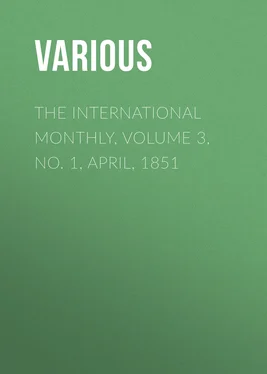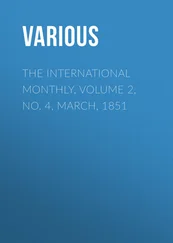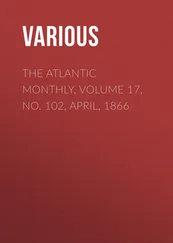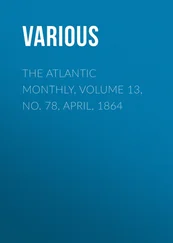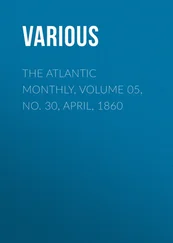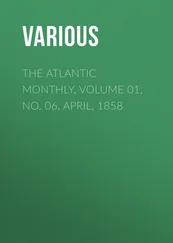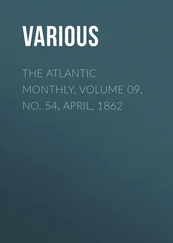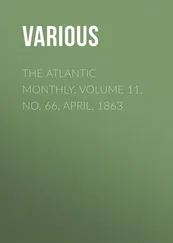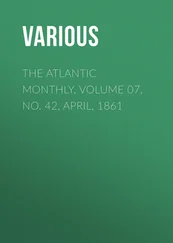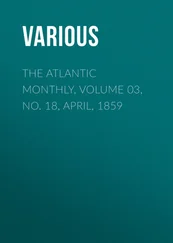Various - The International Monthly, Volume 3, No. 1, April, 1851
Здесь есть возможность читать онлайн «Various - The International Monthly, Volume 3, No. 1, April, 1851» — ознакомительный отрывок электронной книги совершенно бесплатно, а после прочтения отрывка купить полную версию. В некоторых случаях можно слушать аудио, скачать через торрент в формате fb2 и присутствует краткое содержание. Жанр: foreign_antique, periodic, foreign_edu, на английском языке. Описание произведения, (предисловие) а так же отзывы посетителей доступны на портале библиотеки ЛибКат.
- Название:The International Monthly, Volume 3, No. 1, April, 1851
- Автор:
- Жанр:
- Год:неизвестен
- ISBN:нет данных
- Рейтинг книги:3 / 5. Голосов: 1
-
Избранное:Добавить в избранное
- Отзывы:
-
Ваша оценка:
- 60
- 1
- 2
- 3
- 4
- 5
The International Monthly, Volume 3, No. 1, April, 1851: краткое содержание, описание и аннотация
Предлагаем к чтению аннотацию, описание, краткое содержание или предисловие (зависит от того, что написал сам автор книги «The International Monthly, Volume 3, No. 1, April, 1851»). Если вы не нашли необходимую информацию о книге — напишите в комментариях, мы постараемся отыскать её.
The International Monthly, Volume 3, No. 1, April, 1851 — читать онлайн ознакомительный отрывок
Ниже представлен текст книги, разбитый по страницам. Система сохранения места последней прочитанной страницы, позволяет с удобством читать онлайн бесплатно книгу «The International Monthly, Volume 3, No. 1, April, 1851», без необходимости каждый раз заново искать на чём Вы остановились. Поставьте закладку, и сможете в любой момент перейти на страницу, на которой закончили чтение.
Интервал:
Закладка:
The Right Honorable Sir John Cam Hobhouse is created a peer with the title of Baron Broughton de Gyfford, in the county of Wilts. His fame in literature has long been lost, in England, in his reputation as a politician; but in this country we know him only as rather a clever man of letters. His most noticeable works that we remember, are, A Journey through Albania, in 1809, Illustrations of the Fourth Canto of Childe Harold, The State of Literature in Italy , and two volumes entitled Letters from Paris during the last Reign of Napoleon . His lordship must be in the vicinity of seventy-five years of age.
Of "Junius" there is still another book—though many good libraries contain not so many volumes as have been written upon the subject—and the journals have almost every month some new contributions to the mystery, increasing the accumulation by which the face of the author is hidden. The last work is entitled "Fac-simile Autograph Letters of Junius, Lord Chesterfield and Mrs. C. Dayrolles, showing that the wife of Mr. Solomon Dayrolles was the amanuensis employed in copying the letters of Junius for the printer; with a Postscript to the first Essay on Junius and his Works: by William Cramp, author of 'The Philosophy of Language.'"
The Passions of the Human Soul , by Charles Fourier, translated from the French by the Rev. John Reynell Morell, with critical annotations, a biography of Fourier, and a general introduction, by Hugh Doherty, has been published by Baliere of London (and of Fulton-street, New-York), in two octavos. This is one of Fourier's greatest works, and the attention given to his principles of society in this country will secure for it many readers here.
Thomas Colley Grattan, the author of Highways and By-ways, Jacqueline of Holland , &c., and a few years ago, British Consul at Boston, is coming to this country to give lectures. He will not be very successful.
The Poems Of Alaric A. Watts, lately published in London, in a very sumptuous edition,—though some of the plates have an oldish look—are much commended in nearly all the reviews, and civilly treated even by Fraser, who once described Watts as a fellow "of some talent in writing verses on children dying of colic, and a skill in putting together fiddle-faddle fooleries, which look pretty in print; in other respects of an unwashed appearance; no particular principles, with well-bitten nails, and a great genius for back-biting." Watts some twenty years since had a controversy with Robert Montgomery who wrote Satan , in such a manner as very much to please his hero (a difficult task in biography), and one of the subjects of protracted and sharp discussion concerned the names of the disputants. Watts maintained that the author of "Hell," "Woman," "Satan," &c., was the son of a clown at Bath, named Gomery; and in return Montgomery, who, allowing that as Watts was the lawfully begotten son of a respectable nightman of the name of Joseph Watts, he had a fair title to the patronymic, denied that he had any claim to the gothic appellation of Alaric. "The man's name," said Montgomery, "is Andrew." This was a great while ago, and the quarrels of the time are happily forgotten. Watts is now fifty-seven years old, and age has sobered him, and given him increase of taste, both as to scandal and to writing verses. There are some extremely pretty things in this book (which may be found at Putnam's).
The Stowe MSS., including the unpublished diaries and correspondence of George Grenville, have been bought by Mr. Murray. The diary reveals, it is said, the secret movements of Lord Bute's administration, the private histories of Wilkes and Lord Chatham, and the features of the early madness of George III.; while the correspondence exhibits Wilkes in a new light, and reveals (what the Stowe papers were expected to reveal) something of moment about Junius . The whole will form about four volumes, and will appear among the next winter's novelties.
The copyrights, steel plates, wood-cuts, stereotype plates, &c. of Walter Scott's works, and of his life, by Lockhart , were to be sold in London, by auction, on the 26th March. This property belonged to the late Mr. Cadell of Edinburgh. The copyright of "Waverly" has five years more to run, and that of the works generally does not terminate for twenty years. This is the largest copyright property ever sold.
Mr. Layard's fund having been exhausted, a subscription was lately set on foot for him in London, and its success we hope will enable him to prosecute his investigations with renewed vigor. He has, we hear, entirely recovered from his late indisposition, and needs but a supply of money to recommence his operations with renewed vigor.
Henry Alford, a very pleasing poet, a profound scholar, and most excellent man, is at the present time vicar of Wymeswold, in Leicestershire, England. He was born in London in 1810, and in 1832 graduated at Trinity College, Cambridge, of which he was afterwards Fellow. In 1835 he was married to his cousin, to whom are written some of his most charming effusions. At Easter in 1844 they lost one of their four children, and the bereavement seems to have induced the composition of many pieces full of tenderness and of remarkable beauty, which appear in the collection of his poems. In 1841 he was elected one of the lecturers in the University of Cambridge, and he is now, we believe, Examiner in Moral and Intellectual Philosophy and Logic in the University of London. He has published, besides his poetical works, which appeared in two volumes, some years since, several volumes of sermons, a work entitled Chapters on the Poets of Ancient Greece , written for the Nottingham mechanics; a volume of University Lectures ; a work intended as a regular course of exercises in classical composition; and the Greek Testament , with a critically revised text, digest of various readings, &c., in which he has displayed sound learning and judgment. He is also editor of a very complete collection of the "Works of Donne", published some years ago at Oxford. The great labor of his life, however, centres in his edition of the Greek Testament , the first volume of which only, containing the four Gospels, has appeared. He is now working hard, eight or ten hours a day, in his theological researches, which promise a liberal harvest. We understand that he has in contemplation a poem of considerable length, the composition of which is to be the pleasant solace of his declining years. Mr. Alford's minor poems have within a few years been very popular in America, and won for their author the warm friendship and sympathy of many who will probably never know him personally. His pure domestic feeling, and hearty appreciation of whatever is most genial and hopeful in human nature, entitle him to the distinction he enjoys of being one of the truest "poets of the heart."
In a sketch of the artist Andrew Wilson, who died in Edinburgh two years ago, the Art Journal gives the following postscript of a letter from Sir David Wilkie to Wilson:
Madrid, Dec. 24th, 1827.My Dear Sir,—Having been employed by our mutual friend, Mr. Wilkie, to copy the above, I cannot let the opportunity pass unimproved of speaking a word in my own name, and to call to your mind the pleasant hours we occasionally passed together many years since. Let me express, my dear sir, my great pleasure in thus renewing, after so long an interval, our acquaintance. You, of course, if you can recollect any thing of me, can only remember me as a raw, inexperienced youngster, while you were already a man, valuable for information, acquirements, and weight of character. With great regard, my dear sir, believe me, truly yours,
Washington Irving.Mr. Alison, the historian, at a recent meeting of the Glasgow section of the Architectural Institute of Scotland, delivered an address in which he reviewed the state and progress of architecture, and its general influence on the mind and on the progress of civilization, from the period when it first became identified with Art to the present time.
Читать дальшеИнтервал:
Закладка:
Похожие книги на «The International Monthly, Volume 3, No. 1, April, 1851»
Представляем Вашему вниманию похожие книги на «The International Monthly, Volume 3, No. 1, April, 1851» списком для выбора. Мы отобрали схожую по названию и смыслу литературу в надежде предоставить читателям больше вариантов отыскать новые, интересные, ещё непрочитанные произведения.
Обсуждение, отзывы о книге «The International Monthly, Volume 3, No. 1, April, 1851» и просто собственные мнения читателей. Оставьте ваши комментарии, напишите, что Вы думаете о произведении, его смысле или главных героях. Укажите что конкретно понравилось, а что нет, и почему Вы так считаете.
